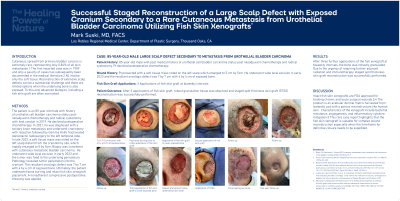Case Series/Study
(CS-148) Successful Staged Reconstruction of a Large Scalp Defect with Exposed Cranium Secondary to a Rare Cutaneous Metastasis from Urothelial Bladder Carcinoma Utilizing Fish Skin Xenografts

Cutaneous spread from primary bladder cancers is extremely rare, representing only 0.84% of all skin metastases.1 The first reported case was in 1909 and only a paucity of cases has subsequently been documented in the medical literature.2 All involve only the soft tissue. Reconstruction of extensive scalp defects can be a substantial challenge and there are limited options when the underlying bone is also exposed. To this end, advanced biologics, including a fish skin graft are often warranted.
Methods:
The patient is an 85 year old male with history of urothelial cell bladder carcinoma status post neoadjuvant chemotherapy and radical cystectomy with ileal conduit in 2019. He declined postoperative chemotherapy. In 2021, he was diagnosed with a solitary brain metastasis and underwent craniotomy with resection followed by Gamma Knife fractionated stereotactic radiosurgery to the left temporal lobe. In late 2022, a soft tissue mass was noted on the left scalp distant from the craniotomy site, which rapidly enlarged to 5 by 5cm. Biopsy was consistent with cutaneous metastatic bladder carcinoma. He underwent wide local excision in early 2023 and the tumor was fixed to the underlying periosteum. Pathology revealed tumor penetration into the cranium. The resultant oncologic defect was 7 by 7 cm with 4 by 4 cm of exposed bone. Ultimately, the patient underwent bone burring and omega -3 fish skin xenograft placement. A nonadherent compressive postoperative dressing was applied.
Results:
After three further applications of the fish xenograft at biweekly intervals, the bone was robustly granulated. Due to the urgency of requiring further adjuvant radiation and immunotherapy, staged split thickness skin graft reconstruction was successfully performed.
Discussion:
Omega -3 fish skin xenografts are FDA approved for treating chronic and acute surgical wounds.3,4 The product is an acellular dermal matrix harvested from Icelandic cod with a porous microstructure like human skin. Characteristics of the xenograft include bacterial resistance, angiogenesis, and inflammatory cytokine mitigation.5 This rare case report highlights that the fish skin xenograft is suitable for complex wound reconstruction especially when the timeframe for definitive closure needs to be expedited.

.jpeg)